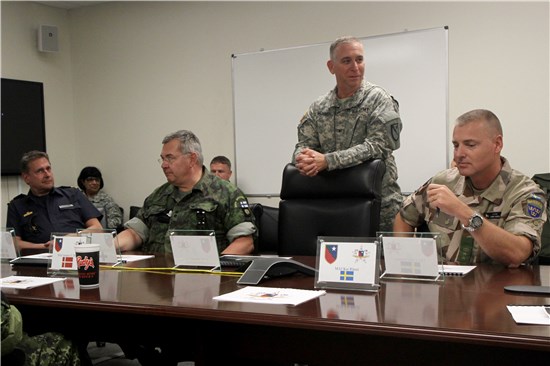 |
| In this image released by Joint Task Force 136 (Maneuver Enhancement Brigade), Brigade Commander Col. Lee Schnell briefs delegates of the Swedish Armed Forces International Centre during their visit to the Round Rock Armed Forces Reserve Center Oct. 28, 2014. The group of service members from Sweden, Finland, and Norway toured various military and civil agency sites throughout central Texas to learn more about the National Guard approach to disaster response. |
Story by Master Sgt. Daniel Griego
ROUND ROCK, Texas - "We are only part of the solution," said Swedish Armed Forces Lt. Col. Conny Hansen. "We have to learn more about how to interact with other agencies: civilian agencies, non-governmental organizations, governmental organizations."
When natural and man-made disasters test the response plans of a region, interagency cooperation is instrumental in the success of rescue efforts. Militaries around the world, in order to mitigate suffering and save lives, are adopting comprehensive plans that integrate the armed forces with local civilian departments. Such is the case with the Swedish Armed Forces and surrounding militaries, as they enhanced their approach to disaster relief by learning from their counterparts within the Texas National Guard.
"This year we decided to have a look at civil-military cooperation as a focus," said Hansen, who serves as the officer in charge of peace operations for the Swedish Armed Forces International Centre (SWEDINT), "and come here to Texas to look at Domestic Operations."
From Oct. 24-30, delegates from Sweden, Norway, and Finland toured central Texas military and civilian sites to learn about our methods of consequence management. Location stops included Camp Mabry, the headquarters for the Texas Military Forces; the Round Rock Armed Forces Reserve Center, home station for Joint Task Force 136 (Maneuver Enhancement Brigade); the Texas Department of Public Safety offices in Austin; the Texas State Capitol; and Fort Hood in Killeen, Texas.
"We have this fact-finding trip to get the picture about the United States or the Texas Military Forces' comprehensive approach," said Finland Army Maj. Anssi Yrjölä, a course director with SWEDINT, "and how they work together with the civilian sector and the military. This is one good example how to conduct comprehensive approach."
The visiting officers coordinate trips like this specifically for the benefit of their centre instructors at SWEDINT, who are tasked with integrating military assets with local civilian agencies in their home countries.
"We teach individual staff officers, mainly officers and senior NCOs, and prepare them for international missions," said Hansen. "Today's contemporary operating environment forces you to have a comprehensive approach. You have to interact with different agencies, like you are here with Domestic Operations."
How the National Guard works alongside civil authorities during emergencies was a defining theme of the trip. As the Guard outfit responsible for the FEMA Region VI Homeland Response Force mission, Joint Task Force 136 (Maneuver Enhancement Brigade) was a perfect fit for what the SWEDINT delegates were looking to discuss.
"I think this is a very unique and very professional unit," said Swedish Navy Lt. Cmdr. Harry Jaantola, a NATO expert with the Peace Support Operations Department. "It's a very, very solid, built-up system; the cooperation they do with the civilian local authorities concerning regular meetings and presentations and stuff like that."
For the members of JTF-136 (MEB), the visit was an opportunity to highlight common goals and improve everyone's capabilities.
"Visits like this enhance the global response community," said Col. Lee Schnell, the commander for JTF-36 (MEB). "When we can share our best practices and develop international relationships, everybody wins."
The discussions were augmented by JTF-136 (MEB) displaying a mock deployment of select elements within its 6th Civil Support Team and the 6th CBRNE Enhanced Response Force Package.
"Visiting with delegates of the Swedish International Centre was a great learning experience," said Spc. Karla Sosawong, an administrative Soldier with the 6th CERFP. "We had the opportunity to share with them what our role is during Domestic Operations and listen to their techniques; it was a great way to integrate efforts."
These efforts will ultimately help to standardize global response operations, fostering collaboration when disaster strikes.
"It's worth it, definitely," said Jaantola. "This has been a great, excellent visit in all ways."